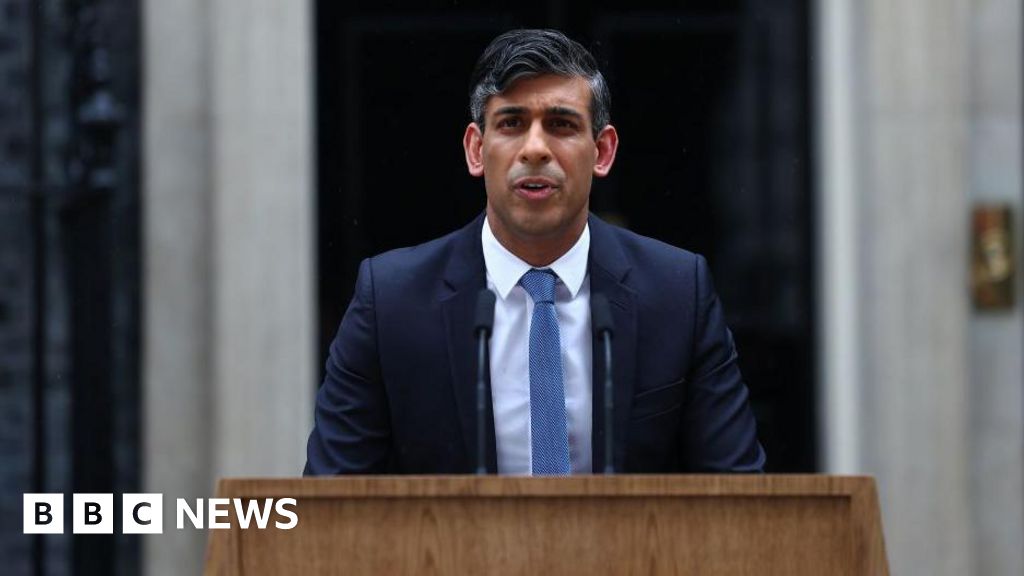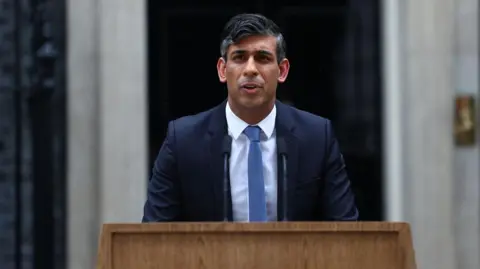Met Police denies being source of election bet leaks

By Chris Mason, Political editor • Daniel Sandford, Home affairs correspondent
 Getty Images
Getty ImagesThe Metropolitan Police has denied being the source of leaks identifying the people being investigated by the Gambling Commission over alleged bets on the date of the general election.
The Daily Telegraph has reported what it calls ‘”a source close to the Cabinet Office” claiming that Scotland Yard had told journalists about those being looked into by the betting regulator.
Police sources have told the BBC the force regards this as an attempted distraction and it is not behind the disclosure of names.
The Met is not being drawn on how many of its officers are being investigated by the Gambling Commission, beyond the constable it acknowledged was being looked into last week, who was arrested and questioned.
The BBC understands there are a “handful” of other officers being looked at by the commission, but it is not yet known how many.
The regulator has not said who it is investigating but so far the names of four Conservatives have emerged – including two who are standing for election.
In a statement the Met Police said: “The allegations that the Met has leaked information are simply untrue.”
A senior source added: “This is a poor distraction technique.”
It also emerged in the same Daily Telegraph article that the Gambling Commission has sent the Met Police information that more officers could possibly be involved in the election betting scandal.
The Met said: “We continue to liaise with the Gambling Commission and are assessing information they have provided.”
The BBC understands the new information relates to a “handful” of officers, but is more sketchy than the information which led to one member of the prime minister’s prime minister’s close protection team being arrested and questioned under caution last week on suspicion of misconduct in public office.
The Met’s assessment of the new information is understood to be at a very early stage.
Any investigation into alleged cheating in bets on the date of the election would remain with the Gambling Commission.

Allegations first emerged earlier this month against Craig Williams – one of the prime minister’s closest aides – who reportedly placed a £100 bet on a July polling day three days before the date was named.
Mr Williams, who is standing for the Conservatives in Montgomeryshire and Glyndwr, told the BBC he had made a “huge error of judgement” but refused to say if he had placed a bet on the basis of inside information.
If someone uses confidential information to gain an unfair advantage when betting, this could be a criminal offence under section 42 of the Gambling Act.
Laura Saunders, the Conservative candidate for Bristol North West, and her partner Tony Lee, the Conservative director of campaigning, are also under investigation, as is Nick Mason, the party’s chief data officer.
Mr Mason’s spokesperson said he denied wrongdoing. Both Mr Mason and Mr Lee have taken leaves of absence from their party roles.
The BBC understands other people linked to the Conservative Party and the government are also being looked into by the Gambling Commission.
On Monday Rishi Sunak said he was not aware of any other Tory election candidates being investigated by the Gambling Commission over alleged bets on the date of the general election.
The prime minister also confirmed that his party was carrying out its own internal inquiries “in parallel” with the regulator’s investigation.
Mr Sunak added that he would “act on any relevant findings” and pass on information to the commission.
He has come under pressure from opposition parties, as well as some Conservatives, to suspend the two candidates being looked at by the regulator.
Over the weekend, Labour’s election coordinator Pat McFadden wrote to the Gambling Commission urging it to “make public the names of other figures” under investigation.
In a reply seen by the BBC, Andrew Rhodes, the regulator’s chief executive, said: “We understand the desire for information, however, to protect the integrity of the investigation and to ensure a fair and just outcome, we are unable to comment on any details at this time, including the name of any person who may be under suspicion.”
Related
Best Crypto Casinos UK – Top 10 Bitcoin Gambling Sites…
Despite its overwhelming popularity, crypto gambling in the UK remains in a legal gray area. All casino operators in the UK need to have a valid permit, as requ
Online gambling channelisation in the UK – How well it…
Gambling in the UK is controlled under the Gambling Act 2005. This act requires all gambling operators to be licensed and regulated by the UK Gambling Commis
UK Gambling Commission Opens White Paper Public Feedback | Suffolk…
The UK Gambling Commission (UKGC) has initiated its third consultation period to gain feedback and proposals to make gambling machines in the UK more secure a
Paddy Power High Court case: Gardener wins £1m payout
Mrs Durber sued PPB Entertainment Limited, which trades as Paddy Power and Betfair, for breach of contract and for the rest of her winnings, based on what she w













